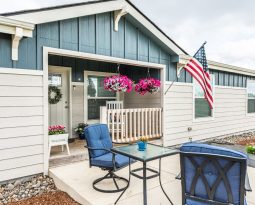Manufactured Homes: Understanding the Correct Terminology Used to Define the Building Process
The correct terminology referencing manufactured housing, as opposed to site-built housing, has long been confusing for home buyers, the media, bureaucrats, the public at large, and to some extent, those employed in the manufactured housing industry.
We will assume the birth of factory-built housing began In 1908, when Sears Roebuck began a new adventure, radical for their time, selling prefabricated, “kit” houses. These mail-order homes arrived complete with framing, finishing, fixtures, and all, with an instruction manual for assembly. Americans built some 70,000 of these affordable homes from over 400 different Sears models. A good number of these have survived, and some even hold a spot in the national historic register.
It is probably ok to assume that these houses were the original prefab homes in the U.S., beginning a long history of factory assembly line home construction that has morphed into what has become today’s modern affordable manufactured housing.
Over the ensuing decades, the terminology referencing factory-built housing has ranged from mobile homes (the most common description), manufactured homes, trailers, modular homes, prefabricated homes (prefabs), panelized homes, tiny homes, and system-built homes.
A home wholly or partially constructed in a factory environment, as opposed to a traditional site-built home, is politically correct and broadly considered a – manufactured home – however, what type of a manufactured home may be confusing to those that do not understand the technically correct terminology used to define the building process.
The construction code requirements to produce these homes is what determines the differences. We will strive to define those differences below and, hopefully, “un-confuse the confused.” We’ll start with the one type of home that does not fit any of those modern-day categories – “mobile homes.”
Mobile Homes – There have been zero mobile homes produced in over 45 years! Say What? How can that be? Yes, that is factually, as well as legally accurate. Before supplying the validation, we will pass along a bit of history that will help explain why after almost five decades, there are many that still refer to today’s manufactured homes as “mobile homes.”
The term “mobile home” is often used interchangeably with the term “manufactured home,” but in fact, they mean quite different things. The only commonality is that both are, or were, built in a factory.
From the 1950s into the 1970s, these factory-built dwellings were also called “trailers.” Even now, there are rental communities that still call themselves “trailer parks.”
In 1954 the term “trailer” was ingrained with the release of a popular movie, The Long, Long Trailer” starring Lucille Ball and Desi Arnaz; in 1965, the classic song “King of the Road” by country singer Roger Miller and later the popular television series, The Rockford Files, starring James Garner.
Aside from the nostalgia, the “trailer home” was often considered to be shabbily constructed and unsafe, and only poor uninformed, socially misfit vagabonds, sometimes cruelly defined as “trailer trash,” lived in these dwellings.
The term “mobile home” became the industry’s preferred nomenclature in the 1960s as the trailer became less mobile with larger and better-built units, more acceptable to home buyers seeking affordable housing. Unfortunately, the stigma of substandard housing still persists in the minds of many.
Manufactured Homes – July 1976 was the implementation date of a law passed by the U.S. Congress titled The Federal Construction and Safety Standards Act administered by the Department of Housing and Urban Development (HUD). The Hud Code regulates manufactured home design and construction, strength and durability, fire resistance, energy efficiencies, and overall quality. The HUD CODE also sets performance standards for heating, plumbing, air conditioning, and thermal and electrical systems.
Technically and legally, there have been zero “mobile homes” built since the implementation of the Hud Code. Manufactured homes are the only form of single-family housing subject to a federally regulated national building code!!
Other forms of factory-built housing that are not built in compliance with the HUD Code include system-built homes, R.V’s, tiny homes, and, yes, modular homes.
Modular Homes – Modular homes are often produced in the same production facilities as HUD Code manufactured homes, utilizing the same quality building efficiencies, materials, and floor plans.
Modular homes are built to be compliant with local and state site-built codes and architectural requirements for placement in “home-only zones.”
A manufactured home is built on a steel frame foundation and chassis with wheels under each section and can be relocated (a rare occasion), whereas a modular home is built to be placed on a site-constructed foundation that permanently attaches the home to the real estate beneath.
Regardless of the terminology employed, A new manufactured home is “everything a home should be” and will be equal or superior in every respect to a traditional site-built home, including quality construction, fire, and wind safety, amenities, fixtures, residential appearance, and will still have a building cost of up to 50% less, not including land.







